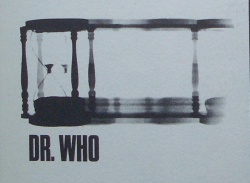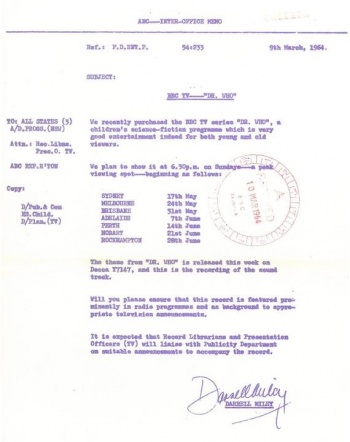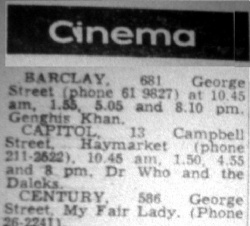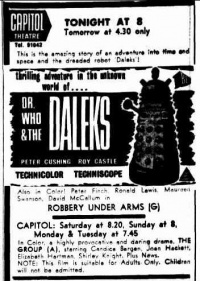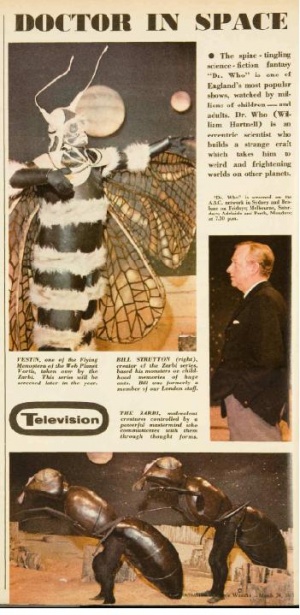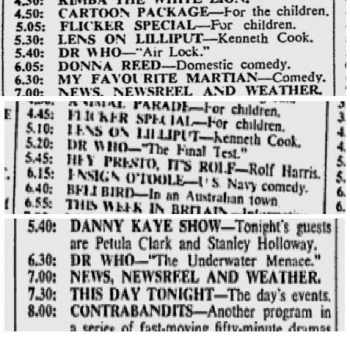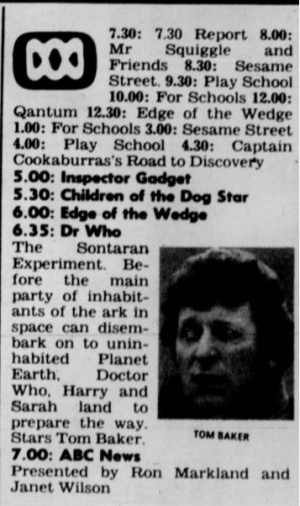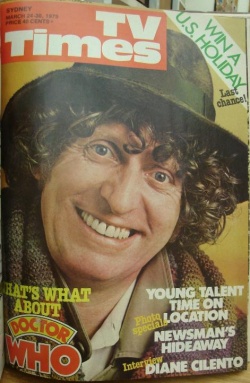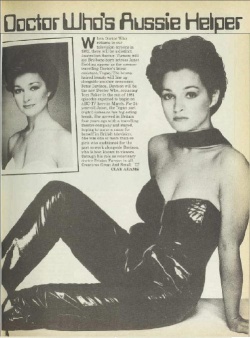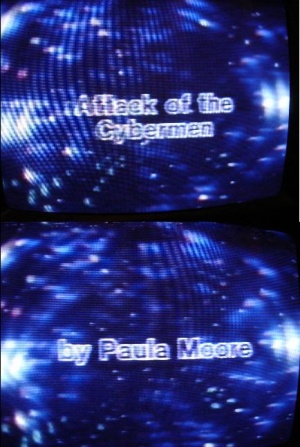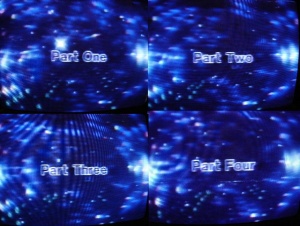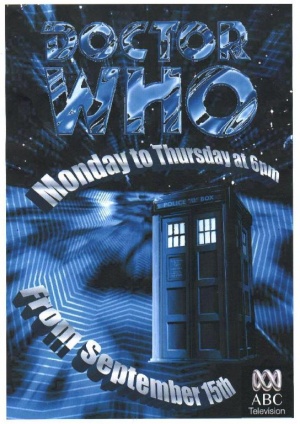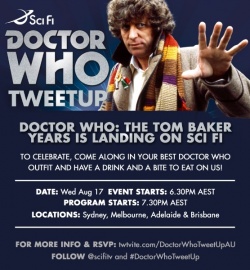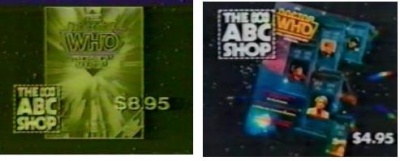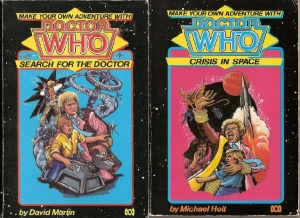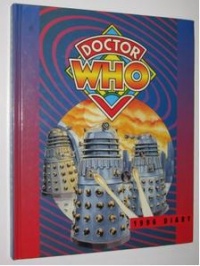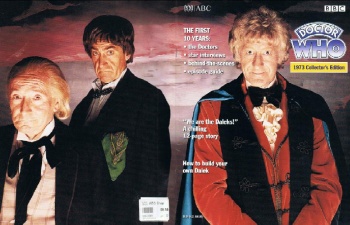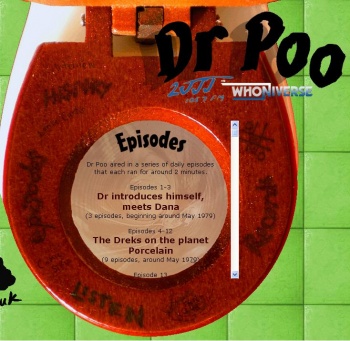Australia
AUSTRALIA is in the Pacific Ocean, and forms part of Australasia. One of its closest neighbours is New Zealand.
Profile
| Country Number (2) | 1965 | FIRST WAVE |
| Region | Australasia/Asia | Commonwealth |
| Television commenced | 16 September 1956 | |
| Colour System | 1 March 1975 | PAL |
| Population | 1966 | 11,362,000 |
| TV Sets | 1966 | 2 million |
| Language/s | English |
Television Stations / Channels
Australia began its television service from 16 September 1956 (Channel Nine).
The country has five major networks: ABC (Channel 2) – commenced broadcasts on 5 November 1956; ATN (Channel 7); TCN (Channel 9); TEN (Channel 10); SBS, plus many state-wide regional and city-based independent stations.
In later years, independent cable and satellite stations launched.
From January 1965 through until June 1994, Doctor Who aired regularly on the non-commercial station, the Australian Broadcasting Commission (the ABC). The ABC changed its name to the Australian Broadcasting Corporation from 1 July 1983.
In the early years of television broadcasts, each state had its own regional scheduling, which meant that different episodes of Doctor Who aired on different days, often many months apart. On rare occasions, the same episode aired on the same day but in different states, which meant that multiple prints of some episodes may have existed, although there were other methods by which 'dual' transmissions across the different states could be achieved. There were not only scheduling differences between states but the larger ones – such as Queensland - also had regional city-to-city variances within the state.
In April 1962, the permanent telecommunications cable link between Sydney and Melbourne (via Canberra) was opened: this allowed for the relaying of and simultaneous broadcasts of programming between the three cities; Channel 9 was the first to adopt this service in 1963, but it's unlikely that the ABC ever used the cable for broadcasts of Doctor Who.
On 9 July 1970, the ABC 'opened' its microwave link between the east and west coasts of Australia, enabling the transmission of programme material across the country. The launch was promoted in a one-hour special, PROJECT AUSTRALIA (7.55pm to 8.55pm), featuring contributions from various Australian cities.
Colour transmissions began on 1 March 1975 using the PAL colour broadcast system. It is possible that some of the minor regional stations may have continued broadcasting in black and white for several months. (By 1977, less than 50% of the population had colour televisions.)
Full country-wide networking on the ABC had commenced by the early 1980s, although there were still regional variances throughout that decade, usually around regional sporting events. It wasn't until the mid-to-late 1980s that full satellite coverage across the entire country was achieved.
From 1 August 1996 to 17 June 2002, the FOX-TEL satellite station, UKTV, aired a run of all available complete stories. They also aired a brief repeat run in 2003.
From 15 September 2003 through to 3 February 2006, the series returned to the ABC for a run of repeats, but which excluded a number of the stories penned by Terry Nation and/or featuring the Daleks; this was due to problems with securing rights from the Nation Estate. (A similar issue affected transmissions of Nation / Dalek serials on UK Gold in the 1990s.)
From 17 August 2011, the Australian SCI-FI channel (established in 1 December 2006) commenced a run of repeats that ran through to the end of 2012. The rebranded syfy channel continued to air episodes of the old series and the new series into 2015…
During 2013, Australia's UKTV celebrated the series' 50th anniversary by showing select stories, one Doctor per month, one full story per week on Sundays. January featured four William Hartnell stories, February had four Patrick Troughton, Jon Pertwee in March, etc, through to Matt Smith in November. (The same stories also aired on New Zealand's own UKTV channel.)
For the 50th anniversary itself, UKTV aired a marathon of complete stories, one for each of the eleven Doctors along with various documentaries and specials.
By 2015, UKTV still airs old and new series episodes…
Language/s
The principal language of Australia is English.
DOCTOR WHO IN AUSTRALIA
Australia was the second overseas country to screen Doctor Who (see Selling Doctor Who). It was, however, the first to be offered the series; and a purchase was confirmed in early March 1964, with transmission planned to commence from 17 May 1964, with other regions to follow.
The ABC duly received film prints from BBC Sydney, and these were sent to the Australian Film Censorship Board (AFCB) for classification; the first two episodes were viewed on 14 April 1964. The censors assigned an "A" classification to the first 13 episodes.
The ABC initially planned to schedule the series in an appropriate time slot for that classification, however after viewing the film print of The Daleks part one, the "negative effect" in the opening scene was mistakenly believed to be a fault on the print, so a replacement copy was sourced from London. This too had the same "fault" – so another replacement was requested. By the time the ABC was made aware of and accepted that the negative effect was deliberate, the original May launch date had past, and there were no longer any available slots in the TV schedule for the remainder of 1964. The new series was held over until January 1965. (New Zealand therefore took the honour of being the first foreign country outside the UK to screen the series.)
Australia is the only country to have screened Doctor Who virtually non-stop, screening episodes of all the Doctors (more or less) in 'chronological order'.
Bar two stories, Australia has the unique position of having purchased and screened every single story of Doctor Who, albeit not always screening them in strict story order.
And with the exception of around 30 stories, it was in Australia that the most number of serials had their foreign debut, usually within a year of the UK screenings. (Other countries in which stories made their foreign debut were the Netherlands, Hong Kong, United Arab Emirates, New Zealand, Canada and the United States.)
DALEK MOVIES
PETER CUSHING Movies
Both Peter Cushing features played in cinemas across the country: for instance, the films opened in theatres in Sydney on 23 December 1965 and 15 December 1967 respectively. The first film played elsewhere, such as in New South Wales and Canberra during 1966.
Both films aired on television (on a regional basis) several times on a number of different stations (but not on the ABC).
BBC RECORDS
The Stanmark Productions Ltd advertisement from 1966, identifies Australia as one of sixteen countries screening Doctor Who by January 1966.
Australia is named in the list of 27 countries in The Making of Doctor Who 1972 Piccolo edition.
The Seventies records a sale of "(70)" stories by 28 February 1977. (This total is incorrect; it should be "(72)"). The Handbook identifies some of these as being: Hartnell - 27; Troughton - 21. The remainder is made up of Pertwee - 19, and Baker - 5 (up to 4E), which totals 72.
The Eighties - THE LOST CHAPTERS records a sale of "(93)" stories (by 10 February 1987).
This figure of 93 is made up of the same 19 Pertwees and 5 Bakers from the 1977 list, plus 33 additional Bakers, 20 Davisons, the 5 previously unaired Pertwees, and 11 Colin Bakers.
In DWM, Australia is identified in 148 story Archives: Hartnell – all 27; Troughton – all 21; Pertwee - 23 (omits WWW); Baker – all 41; Davison - 15 (omits 5W, 6H, 6L, 6P, 6Q; Baker - 9 (omits 6W and 7C 13-14); McCoy – all 12.
The period of sale is given as from May 1964 to November 1990.
STORIES BOUGHT and BROADCAST
The BBC offered the series to the ABC, which had first-refusal on all BBC productions over the other Australian television networks. By March 1964, the broadcaster had purchased the rights to the first batch of stories, with the provision for a first screening (across all regions), plus a repeat (across all regions). All subsequent repeats were renegotiated, usually with the provision of two screenings across all regions.
Of the 158 Doctor Who stories made from 1963 to 1989, there have been nine that did not air in Australia during first-run screenings in the 1960s and 1970s. These nine are:
- Mission to the Unknown
- The Daleks' Master Plan
- Inferno
- The Mind of Evil
- The Daemons
- The Green Death
- Invasion of the Dinosaurs
- The Brain of Morbius
- The Deadly Assassin
Mission to the Unknown was "Rejected" outright due to its horror content, while another seven were given "A" rating classifications, and as such they could not be broadcast in the early evening timeslot favoured by the ABC. The Dinosaurs serial appears to have been rejected because it could only be supplied in black and white, when the ABC was only interested in colour material at that time.
The fact that the first seven of these nine stories did not air in Australia prevented other Asian Commonwealth countries – such as New Zealand, Hong Kong and Singapore - from being able to afford to purchase them. This 'restriction' was still in effect into the 1980s, hence New Zealand could not purchase Logopolis ahead of Australia in 1981…
The situation with The Brain of Morbius and The Deadly Assassin was slightly different, in that the former did go to air (but heavily truncated, and late at night), but the latter didn't - although there's every reason to believe that the ABC had intended to screen The Deadly Assassin in a similar way. (The biggest clue is that both serials aired in New Zealand in 1979, which suggests that both had been purchased by the ABC…)
All bar the first two serials of that list - all copies of which had been wiped by the BBC by the mid-1970s - did eventually screen in Australia as part of "repeats" packages broadcast in the 1980s.
WILLIAM HARTNELL (1965-67)
27 stories, 121 episodes
| A | An Unearthly Child |
| all bar two stories to | |
| DD | The Tenth Planet |
| (Excluding) | |
| T/A | Mission to the Unknown |
| V | The Daleks' Master Plan |
Australia therefore screened all of the William Hartnell stories, with the exception of two.
The programme was supplied as 16mm black and white film prints with English soundtracks.
The episodes were censored between April 1964 and May 1967.
The batch of 20 episodes covering Galaxy 4 to The Daleks Master Plan (which was only available as an 11-parter) had been offered to the ABC on 9 March 1966.
Origin of the Prints?
Australia received pristine prints from BBC Sydney via London.
Fate of the Prints?
The ABC had a strict policy of returning or destroying its prints. While the actual fate of all the prints is unverified, the following is known to have happened to some of the prints:
- The ABC's prints of all 17 episodes from The Reign of Terror through to The Rescue (the affected episodes still exhibiting the cuts that had been made by the censors) were sent to New Zealand in July 1967.
- A consignment of eight Hartnell serials was returned to the BBC in London in mid-1975: the last three from season two, three 4-parters from season three, and Hartnell's final two serials (from season four). (Also sent was the majority of the Troughton serials, see below). From this batch, part three of Galaxy 4 was salvaged, and returned to the BBC in 2011.
- Although listed as being part of the 1975 consignment, The Chase part one was later found in Australia. Was the episode not actually sent – or was it a duplicate print?
- Not part of the 1975 consignment was The Celestial Toymaker, part four of which was recovered from the ABC film store at the now-demolished Frenchs Forest studios in 1984. (Refer below for how that film allegedly came to be found there...)
- Also excluded from the shipment was The War Machines, of which a copy of part two was saved from destruction in Australia.
- The few stories not sent to London were apparently destroyed in mid-1976:
On 1 September 2003 this posting was made to an Australian AUDIO/VISUAL FORUM:
- "Fess up time! And just who do you think put the axe through the Australian copies of the first 300 approx b/w 16mm telerecordings of the early Dr Who episodes - only to find out years later that the BBC had junked most of their originals.
- It was a long, long time ago, in another life … but I will carry this shame with me to my grave, along with the destruction of another early BBC classic "Sci Fi" series called "Out Of The Unknown", my excuse, much like the Nazis at the Nuremberg trials, is/was "Just following orders" – God what a waste!
- The only bright side was that some years later whilst doing a bin search of the main program vault, looking for another missing program, I found one Dr Who episode that had been miss-binned and not junked with all the others, and it turned out to be after consulting with BBC Archives, the only print of this particular episode left in the world... "The Celestial Toymaker", alas it was only 1 episode out of a 4 or 5 part story IIRC, still it was returned to the Beeb with much thanks from them and I believe [it later] went through a print restoration process by BBC Archives.
- Shame, Shame, Shame..."
- Jet:ph34r"
If this is indeed a true and accurate account of events, how has the figure of "300 approx" been arrived at? There were 253 Hartnell and Troughton episodes, plus 78 Pertwees on 16mm film, out of which 17 Hartnell episodes had been sent to New Zealand in 1967, and some Pertwees to Singapore in 1974, with the bulk sent to London in mid-1975, so that's less than 200. But as we've noted on the Australia TX 1965-1967 page, there may have been two, three or four duplicates of certain stories within each Block of the first two Doctors alone, so taking that into consideration, a figure of 300 or so wouldn't be that far off the mark. There is also the fact that he recalls destroying that many personally, but of course he may not have been the only one charged with undertaking that particular task at that time and someone else destroyed all the others…
PATRICK TROUGHTON (1967-71)
21 stories, 119 episodes
| EE | The Power of the Daleks |
| all stories to | |
| ZZ | The War Games |
Australia therefore bought all of the Patrick Troughton stories.
The programme was supplied as 16mm black and white film prints with English soundtracks.
The episodes were censored between June 1967 and September 1970.
It was during the screening of season six, that the ABC's west / east microwave link was established.
Origin of the Prints?
Australia received pristine prints provided by BBC Sydney.
Fate of the Prints?
- The ABC retained its prints of The Power of the Daleks until 1974, as extracts from two episodes of that serial were used for a documentary about computers that was screened by the ABC on 29 May 1974. (The film extracts were subsequently returned to the BBC in 1995.)
- A consignment of Troughton episodes consisting of all but five serials – The Highlanders, The Macra Terror, Fury from the Deep, The Wheel in Space and The Krotons - was returned to the BBC in London in mid-1975 (along with a consignment of Hartnells, as noted above). From this batch, part two of The Underwater Menace was salvaged, and returned to the BBC by a film collector in 2011. The edited prints of The Dominators were found in 1978 to be still held by the BBC's film library.
- Although it is listed as being one of the serials returned to the BBC in 1975, The Faceless Ones part one (with censor edits) was recovered in Australia circa 1969/70, and returned to the BBC in the late 1970s. Did some episodes not get sent to London after all - or was this a duplicate print?
- The Krotons was subsequently set to London in mid-1976. Later that same year, the other four Troughton stories were destroyed.
JON PERTWEE (Block One 1971-76)
19 stories, 98 episodes, but not always screened in story order
| AAA | Spearhead from Space |
| all bar five stories to | |
| ZZZ | Planet of the Spiders |
| (Excluding) | |
| DDD | Inferno |
| FFF | The Mind of Evil |
| JJJ | The Daemons |
| TTT | The Green Death |
| WWW | Invasion of the Dinosaurs |
Australia therefore bought most of the Jon Pertwee stories, with the exception of five stories not purchased or screened due to various issues.
All the Pertwee episodes up to and including Invasion of the Dinosaurs were supplied as 16mm black and white film prints with English soundtracks.
PAL colour video tapes with English soundtracks were also supplied for all available serials covering The Three Doctors to Planet of the Spiders (that's all the stories excluding the Dinosaurs tale, and perhaps part three of the 6-part Daleks serial), which were intended to be repeated following the launch of colour transmissions in March 1975. (The 16mm b/w prints may have also been used by those regional stations that had not fully converted to colour.)
The tapes included an extended version of part 2 of Carnival of Monsters, and a copy of Frontier in Space part 5 with the alternative music.
(NOTE: It's uncertain whether Planet of the Daleks was supplied to the ABC in colour, as it appears that by 1973, when the serial was offered, part three of that had already been wiped by the BBC…)
The episodes were censored between January 1971 and May 1975, usually no more than six months after completion of each season in the UK.
Four serials were classified with "A" ratings, which meant they could not be screened in the early evening timeslot favoured by the ABC. Since the Dinosaur adventure was available only in black and white, it was not purchased.
Origin of the Films / Tapes
The 16mm films would have been supplied by BBC Sydney via London.
The colour video tapes were also supplied via BBC Sydney.
Fate of the Films
It's believed that the ABC (or BBC Sydney) sent the black and white prints of Planet of the Daleks to Singapore on 24 March 1974, where they screened from 2 May to 6 June 1974. (It's possible that other b/w prints of season ten Pertwee stories were also sent to Singapore at the same time.)
The majority of the other film prints were mostly junked by the ABC after the final run of repeats in 1974/75. Some of these films are known to have survived junking, and are held in a private collection.
Fate of the Tapes
In 1983, it was discovered that copies of complete PAL video tapes of Frontier in Space were still held in storage by the ABC's bond store, where they had been since 1973, a fact that was not known to BBC Enterprises in London, who was offering the story in black and white only. (BBC Sydney however, did sell Frontier in Space in colour to Brunei, where it aired in October 1976.)
TOM BAKER (Block One 1976-78)
16 stories, 64 episodes plus one omnibus edition
| 4A | Robot |
| 4B | The Sontaran Experiment |
| 4C | The Ark in Space |
| 4E | Genesis of the Daleks |
| 4D | Revenge of the Cybermen |
| 4F | Terror of the Zygons |
| all bar one story to | |
| 4S | The Talons of Weng-Chiang |
| (Excluding) | |
| 4P | The Deadly Assassin |
The ABC had actually decided to drop the series mid-way through Tom Baker's first season in 1976, but ultimately reversed that decision and screened the remaining purchased season 12 episodes in 1977, and purchased new episodes in 1978.
Australia therefore bought GROUP A, B and C of the Tom Baker stories, with the exception of one story, which was not purchased and screened due to censorship issues.
The programme was supplied as PAL colour video tapes with English soundtracks.
The episodes were censored between September 1975 and March 1978, usually no more than six months after completion of each season in the UK.
The Brain of Morbius was given an "A" rating, and therefore was not screened. The ABC later acquired a copy of the 60 minute "repeat" that had screened in the UK on 4 December 1976, and this was submitted to the censors on 6 September 1978, but even the heavily truncated story was allocated an "A" rating. However, the shortened version did go to air but in a very late night timeslot: in Adelaide in 1978, and other regions in 1980.
Pyramids of Mars was heavily cut for its first screening, and further cuts made to it for the subsequent repeats.
JON PERTWEE (Block Two 1978)
One story, 6 episodes
| TTT | The Green Death |
Origin of the Tapes?
In mid-1978, the ABC purchased a repeat run of Pertwee stories, to be screened in colour for the first time. But with many of the original PAL tapes having been wiped by the BBC, the ABC was supplied only with those few serials that existed entirely in PAL colour: Spearhead from Space and Day of the Daleks. Reportedly, these colour video tapes ware sourced from the Middle East – most likely to be from United Arab Emirates, or possibly closer to home, from Brunei, where the colour serials had concluded by 1975/76.
The ABC already held - since 1973 - the colour tapes of The Three Doctors, Carnival of Monsters (with an extended version of part 2), the same stories from season 11, as well as tapes for one story that had been previously withheld.
The colour tapes of The Green Death were still held by BBC Sydney. In May 1978, the story was re-classified from "A" to "G" by the AFCB, and it was able to be screened. (This re-classification also paved the way for the 6-parter to air in New Zealand in 1979. Since the serial had previously aired in Commonwealth Canada, the ABC probably purchased the serial at a much cheaper rate!)
(Since the BBC was only offering Frontier in Space in black and white, it did not include that serial in the 1978 repeats; neither BBC Sydney nor the ABC were unaware that the ABC still held complete PAL colour tapes for that serial in its film and tape bond store!)
TOM BAKER (Block Two 1979-80)
17 stories, 72 episodes
| 4V | Horror of Fang Rock |
| all stories to | |
| 5L | The Horns of Nimon |
The programme was supplied as PAL colour video tapes with English soundtracks.
The episodes were censored in three separate blocks, between May 1978 and March 1980, usually no more than six months after completion of each of the three seasons in the UK.
TOM BAKER (Block Three 1982)
Seven stories, 28 episodes
| 5N | The Leisure Hive |
| all stories to | |
| 5V | Logopolis |
Australia therefore bought all of GROUP F and G of the Tom Baker stories. The programme was supplied as PAL colour video tapes with English soundtracks.
The transmission of season 18 was held over for a year, so the ABC could screen it back to back with season 19 to ease the transition between Doctors.
The first 24 episodes were censored between January and April 1981, shortly after completion of the series in the UK. Logopolis however, was not assessed until March 1982.
It is thought that the ABC might not have been able to purchase this last serial at the time, because their budget allocation for 1981/82 did not take into account the season being two episodes longer than usual. Logopolis was therefore held over to the next financial year, hence the delay in having it censored, some eleven months after the rest of season 18 had been assessed. As a direct result of this, despite TVNZ having acquired the tapes in 1981, Logopolis could not be screened in New Zealand until after it had been purchased by the ABC.
PETER DAVISON (1982-84)
20 stories, equivalent of 70 half-hour episodes and one 90 minute special
| 5Z | Castrovalva |
| all stories to | |
| 6R | The Caves of Androzani |
Australia therefore bought all of the Peter Davison stories. The Five Doctors was supplied in its 90 minute version. The ABC helped the BBC to finance the special.
The programme was supplied as PAL colour video tapes with English soundtracks. The BBC edited the original 50 minute episodes of Resurrection of the Daleks by cutting them in half at a convenient moment, creating 'new' cliffhangers, but without adding recaps. The Episode number captions were also removed: Parts Two, Three and Four did not have 'number' captions.
The episodes were censored between March 1982 and April 1984, usually only a few months after completion of each season in the UK.
COLIN BAKER (Block One 1984)
One story, 4 episodes
| 6S | The Twin Dilemma |
The programme was supplied as PAL colour video tapes with English soundtracks.
JON PERTWEE (Block Three 1984)
A further repeat run of colour Pertwees was scheduled for 1984. The package supplied included a "new" Pertwee story that had not screened before due to censorship issues, but which was subsequently cleared for screening:
One story, 5 episodes
| WWW | Invasion of the Dinosaurs |
The programme was supplied as PAL colour video tapes with English soundtracks. Part One was not supplied as it existed only as a 16mm black and white film print. Accordingly, Part Two was re-captioned to become PART ONE, Part Three became PART TWO, and so on.
Also included in this package was The Curse of Peladon, which had not previously been screened in colour before; it had been recently repeated in the UK.
K9 AND COMPANY (1984)
50 minute special
| K9 and Company |
The programme was supplied as PAL colour video tapes with English soundtracks.
COLIN BAKER (Block Two 1985-86)
Six stories, equivalent of 26 half-hour episodes
| 6T | Attack of the Cybermen |
| all stories to | |
| 6Z | Revelation of the Daleks |
Australia therefore bought all of GROUP A of the Colin Baker stories.
The programme was supplied as PAL colour video tapes with English soundtracks. The BBC in London re-edited the original 45 minute episodes into 25 minute segments, by cutting them 'in half' at a convenient moment and creating 'new' cliffhangers. The opening title captions were modified to reflect the new episode numbering; a new "squared" font was used for the remade titles, writer credits and episode numbers.
By this time, the ABC was responsible for its own censorship ratings. Only Revelation of the Daleks was cut by the in-house censors. (An uncut version of this story has never screened in Australia.)
JON PERTWEE (Block Four 1986)
Three stories, 18 episodes
| DDD | Inferno |
| FFF | The Mind of Evil |
| JJJ | The Daemons |
In 1985, the BBC reissued all 24 of the Pertwee stories - in a mix of colour and black and white episodes (but still not including the b/w part one of Invasion of the Dinosaurs). The complete package was sold to the United States, New Zealand and Australia; the package purchased by Australia included the above three stories that did not screen in the 1970s due to censorship issues, but which were now cleared for screening by the ABC's in-house censors.
The standard (i.e. not extended) versions of Carnival of Monsters and Frontier in Space were also supplied.
These programmes were supplied as PAL colour video tapes, NTSC to PAL conversions, or tape transfers from 16mm black and white film, with English soundtracks.
COLIN BAKER (Block Three 1987)
One story, 14 episodes
| 7A-7C | The Trial of a Time Lord |
The programme was supplied as PAL colour video tapes with English soundtracks.
TOM BAKER (Block Four 1987)
For a subsequent repeat run of Tom Baker stories, the ABC acquired one further Tom Baker serial that had previously been unable to screen due to censorship issues:
One story, 4 episodes
| 4P | The Deadly Assassin |
The programme was supplied as PAL colour video tapes with English soundtracks.
At this same time, The Brain of Morbius, which had previously aired in 1978 and 1980 as a 60 minute edited edition, was reclassified as "G" and able to be screened in full during this run.
SYLVESTER McCOY (1988-1990)
Twelve stories, 42 episodes, not screened in correct order
| 7D | Time and the Rani |
| all stories to | |
| 7P | Survival |
Australia therefore bought all of the Sylvester McCoy stories.
The programme was supplied as PAL colour video tapes with English soundtracks.
The Curse of Fenric did not have the Russian to English subtitles over the opening moments of Part One.
PAUL McGANN (1996)
TV Movie, 84 minutes
| TVM | The TV Movie |
Australia was the third country to screen the movie.
JON PERTWEE (Block Five 1997)
One 'new' episode
| WWW | Invasion of the Dinosaurs | 1 |
The b/w first episode of this serial aired for the first time in Australia on 28 March 1997, on UKTV.
The broadcast of this episode marked the equivalent of the 683rd and final 'new' instalment of Doctor Who to screen on Australian TV (albeit some still in an edited form). It had taken 32 years to reach this milestone...
TRANSMISSION
Doctor Who has aired on three different broadcasters in Australia:
ABC (Channel 2) (1964-1996)
The series aired across Australia on a regional basis:
| Region | Capital | First Airdate | |
|---|---|---|---|
| Western Australia | Perth | 1st | 12 Jan 1965 |
| New South Wales | Sydney | 2nd = | 15 Jan 1965 |
| Australian Capital Territory | Canberra | 2nd = | 15 Jan 1965 |
| Queensland | Brisbane | 4th | 22 Jan 1965 |
| Victoria | Melbourne | 5th | 20 Feb 1965 |
| South Australia | Adelaide | 6th | 15 Mar 1965 |
| Tasmania | Hobart | 7th | 11 Jun 1965 |
| Northern Territory | Darwin | 8th | 15 Aug 1971 |
Episodes tended to be aired at the same timeslot in each region; there is a two-hour time difference between west coast (Perth) and east coast (Brisbane), so there was always at least this slight variance across the country.
The final regular screening on ABC was a repeat of Revelation of the Daleks part four, on 3 March 1994.
ABC's rights expired on 30 June 1994.
The Paul McGann TV Movie aired on Sunday, 3 July 1996, and was repeated on 15 January 1997.
This transmission marked the final screening of Doctor Who on the ABC in the twentieth century, where it had had its home for 32 years...
**PAPUA NEW GUINEA**
By late 1985, the ABC had extended its transmission coverage via one of the AUSSAT satellites to reach the island of New Guinea. Doctor Who was therefore seen by viewers in Papua New Guinea and Australia simultaneously from late 1985 onwards.
Refer to the profile of that country for further details.
UKTV / FOXTEL (1996–2002)
UKTV was a pay-TV channel, featuring programming from the BBC and Freemantle Media (Thames and Grundy) broadcast on Foxtel (channel 20), OptusTV (channel 26) and Austar (channel 7).
Katy Manning provided voice-over continuity links.
Transmission of Doctor Who commenced on Thursday, 1 August 1996. Episodes aired episodically Monday to Friday (at 11.30pm), with a separate stream of omnibus editions airing Saturdays (at 1.00pm) and Sundays (9.00am).
All the existing serials aired, including the 17 complete William Hartnell stories (albeit not always in strict story order), and six complete Patrick Troughton stories (including the first airing of The Tomb of the Cybermen since its recovery in 1992), then all serials of the third through eighth Doctors.
This run also included for the first time on Australian TV the b/w first episode of Invasion of the Dinosaurs. The Ambassadors of Death however, was shown with a mixture of both colour and b/w episodes.
The final episode to air on UKTV was on Monday, 17 June 2002.
UKTV also aired a short run of special 40th Anniversary repeats, from 11 October to 23 November 2003, concurrent with the ABC repeats (see below). For this run, at least one serial (in an omnibus format) per Doctor aired:
- An Unearthly Child
- The War Games (split in two: eps 1-5, 6-10)
- The Three Doctors
- The Green Death
- The Deadly Assassin
- Logopolis
- The Five Doctors
- The Caves of Androzani
- The Two Doctors
- The Trial of a Time Lord (eps 13-14 only)
- Survival
- TV Movie
ABC (Channel 2) (2003-2006)
Doctor Who returned to the ABC from Monday, 15 September 2003 for a three-year run of repeats, under the generic banner "Back to the Future".
This run included the first through seventh Doctors only.
However, due to rights issues with the estate of Terry Nation, the following serials (42 episodes) could not be screened:
- The War Games
- Day of the Daleks
- Frontier in Space
- Planet of the Daleks
- Destiny of the Daleks
- Resurrection of the Daleks
- Revelation of the Daleks
- Remembrance of the Daleks
Also skipped was the TV Movie.
This run commenced a matter of weeks ahead of the BBC's announcement that the series was to be revived. Ironically, by mid-2004, the BBC itself experienced difficulties with securing from Nation's estate the rights to use the Daleks…!
Death to the Daleks aired uncut for the first time.
The final airings of this ABC run were Survival parts two and three, which aired together on Friday, 3 February 2006.
SCI-FI / syfy (2011 to ????)
Starting on Wednesday, 17 August 2011, the full run of Tom Baker stories commenced on the Australian Sci-Fi Channel (Channel 125). These aired weeknights at 5.30pm, usually two episodes back to back.
From 19 March 2012, the Peter Davison stories commenced…
The Jon Pertwee stories concluded in November 2012.
In 2013, 2014 and 2015, syfy aired repeats of the classic series as well as repeats of the new series…
UKTV / FOXTEL (2013 to ????)
Australia's UKTV celebrated Doctor Who's 50th Anniversary in 2013 with a run of weekly (on Sundays) omnibuses, one Doctor shown each month, from January to November.
In 2014 and 2015, UKTV continued to play repeats of the new series episodes.
TRANSMISSION and AIRDATES
Full Transmission History and Airdates coverage is presented on the linked series of pages:
| Table of Airdates in Australia |
| 1965-66 | 1966-67 | 1967-71 | 1971-75 | 1976-78 | 1979-82 | 1983-85 | 1985-90 | 1991-2002 | 2003-(2020s)
THE AIRDATES COLUMNS ON EACH PAGE HAVE BEEN SEQUENCED TO REFLECT TRANSMISSION ORDER BY FIRST TO LAST REGION PER = PERTH | DAR = DARWIN | ADE = ADELAIDE | MEL = MELBOURNE | HOB = HOBART CAN = CANBERRA | SYD = SYDNEY | BRI = BRISBANE | RKH = ROCKHAMPTON | TVL = TOWNSVILLE Key: BOLD = first airing | ITALICS = repeat (TABLE OF REPEATS IS HERE) |
- The years in which each story was REPEATED is indexed on a sortable table.
TV LISTINGS
The following online newspaper archives (issues available only to 31 December 1989) have been accessed:
Our TV listings have also been compiled from numerous Australian newspapers, fanzines, TV Guides and other listings publications (far too many to list here), plus the generous contributions of Australian fans listed below. The following online fan sites have also been accessed:
This FORUM at Gallifrey Base also provided lots of useful anecdotal information:
The Doctor Who Cuttings Archive also has scans of or links to other articles and features from Australian newspapers and magazines
MERCHANDISE
Several items of merchandise unique or specific to Australia have been released over the years. While it is beyond the scope of even BroaDWcast to attempt to catalogue all of these, those of interest include:
- Doctor Who Technical Manual (1983) - same as the UK edition, but with the ABC's logo on the cover; published by J M Dent Pty Ltd (Retailed for $8.95)
- BBC Doctor Who 20th Anniversary Special – same as the UK's Radio Times publication, but with slightly different cover text (Retailed for $4.95)
- Make Your Own Adventure books – same as the UK editions, only the first two books in this series - "Search for the Doctor" and "Crisis in Space" - were released with the ABC's logo on the cover; published by J M Dent Pty Ltd in 1986 (Retailed for $4.95)
- 1996 Diary - published by Mallon Publishing Pty Ltd and distributed by Angus & Robertson Book World
- BBC Videos / DVDs (region 4) – the Australasian releases (for Australia and New Zealand) were authored and manufactured in Australia, and the packaging carries ABC logos
- In 2003, the 1973 Radio Times' 10th anniversary special was reissued as a special reprint. The ABC published its own edition of the magazine, which was identical in all respects except for the cover, and the text at the bottom of the column with the 'copyright' blurb. It retailed for $9.95. (The magazine also had a New Zealand price of $10.95, but there is some doubt that the magazine was ever available in that country.)
Many of the items were sold through The ABC Shop, a chain-store owned and operated by the broadcaster, and selling TV-tie-in material. Although the ABC was a non-commercial broadcaster, television spots for products sold through the ABC Shop were often placed at the end of the credits; Doctor Who merchandise, such as videos and books, was often promoted after the programme.
- A parody called "Dr Poo", a 2-minute comedy radio serial that broadcast over 450 episodes in one massive run, from 1979 to 1981(?) inspired a couple of LPs – such as "Dr Poo and the Psychic Koalas", released in 1985 .
- Other examples of 'unique to Australia' merchandise are the novelty songs:
- Jackson Zumdish: "I Wanna Be Doctor Who" (Agro Fish, 1980)
- Bullamakanka: "Doctor Who is Gonna Fix It" (RCL, 1983)
|
BULLAMAKANKA |
|
|
|
NEWS ITEMS, PROMOS and TRAILERS, etc
The following are some of the items available on YouTube:
|
COMMERCIAL FOR STREETS ICE CREAM |
AFTERNOON SHOW "THE WHO GAME" QUIZ |
|
TOM BAKER INTERVIEW FEBRUARY 1979 |
|
|
AFTERNOON SHOW NovaCon 5/11/91 |
AFTERNOON SHOW 27/11/91 |
|
THE LATE SHOW 1993 SPOOF |
TV NEWS ITEMS re PERTWEE'S DEATH |
|
CHASER'S WAR ON EVERYTHING PARODY SONG |
- Other YouTube clips are located within the Transmission History pages.
FAN CLUBS
Australia has a very strong fan culture. There are fan clubs in each of the states, some of which have an online presence:
- HISTORY OF DOCTOR WHO CLUB OF AUSTRALIA
- DOCTOR WHO FAN CLUB OF AUSTRALIA
- DOCTOR WHO CLUB OF VICTORIA
- THE WEST LODGE (WESTERN AUSTRALIA)
- SOUTH AUSTRALIA FAN CLUB
- AUSTRALIAN COLIN BAKER SITE
Many thanks to
Donald Bain; Dylan Crawfoot; Alan Creaser; Matt Dunn; Martin Dunne; Daniel Frankham; Dallas Jones; John Lister; George Rainey; Damian Shanahan; Grant Sirett; Data Extract; Dark Circus
AUSTRALIA IN DOCTOR WHO
Australia has been mentioned directly or indirectly many times; and a number of Australian actors or production personnel have worked on the series:
BEHIND THE SCENES:
- Writers Anthony Coburn (An Unearthly Child), Bill Strutton (The Web Planet)
- Composers Ron Grainer, Dudley Simpson, Tristram Carey
- Viktors Ritellis (Assistant Floor Manager on The Crusade)
- Sue Wills (Production Secretary on Galaxy 4 and The Invasion)
- Sandra Reid (designer (The Tenth Planet)
- Lennie Mayne (director The Curse of Peladon, The Three Doctors, The Monster of Peladon, The Hand of Fear)
ACTORS:
- Dalek operators Bob Jewell and Kevin Manser (various episodes and spin-off movies)
- Ray Barrett (Bennett; The Rescue)
- Roslyn de Winter (Menoptra Vrestin and "Insect Movement" in The Web Planet, the Grey Lady The Chase)
- Barbara Joss (Nemini in The Web Planet)
- Bruce Wightman (William de Tornebu, The Crusade; Scott The Daleks' Master Plan; Radio Operator, Terror of the Zygons)
- John Maxim (Frankenstein's monster, The Chase; Cyberman, The Moonbase (credited as John Wills)
- Lyn Ashley (Drahvin in Galaxy 4)
- Bill Hunter (The Ark)
- Alan White (Schultz in The Tenth Planet)
- Pamela Ann Davy (Janley in The Power of the Daleks)
- Ron Pinnell (Scientist in The Moonbase)
- Bill Kerr (Giles Kent, The Enemy of the World)
- David Nettheim (Fedorin, The Enemy of the World)
- Reg Lye (Griffin, The Enemy of the World)
- Dibbs Mather (Guard in Caravan, The Enemy of the World)
- Gordon Stothard (Yeti, The Web of Fear; Cyberman, The Wheel in Space)
- Norman Atkyns (The Guardian, Colony in Space; Rear Admiral, The Sea Devils)
- Sarah Kemp (aka Gypsie Kemp) (UNIT Radio Operator in Day of the Daleks)
- Damon Sanders (Skybase Guard, The Mutants)
- Kevin Lindsay (Linx, The Time Warrior; Cho-Je, Planet of the Spiders; Styre/The Marshal, The Sontaran Experiment)
- John Gregg (Lycett, The Ark in Space)
- Edmund Pegge (Meeker, The Invisible Enemy)
- Adrienne Burgess (Veet, The Sun Makers)
- Lewis Fiander (Tryst, Nightmare of Eden)
- Bob Hornery (Pilot in The Horns of Nimon)
- Janet Fielding (Tegan Jovanka)
- Dolore Whiteman (Aunt Vanessa in Logopolis)
- Peter Dahlsen (Horton, Time-Flight)
- Dolore Whiteman's daughter played one of the Lorrells in Delta and the Bannermen.
GENERAL REFERENCES:
- A cricket match between Australia and England is interrupted during The Daleks Master Plan
- Dan "Blue" Schultz, the ZEUS IV astronaut, is Australian (The Tenth Planet)
- The ZEUS spaceships are launched from Woomera (The Tenth Planet)
- Moonbase crewmen J Elliot (No 5) and Robert "Bob" Anders (No 7) are Australian (The Moonbase)
- There is an Ioniser Base in Australasia (The Ice Warriors)
- The Enemy of the World is partially set in Australia, and features many Australian characters.
- Leo Ryan and Bill Duggan are both Australian (The Wheel in Space)
- There is a T-Mat terminal in Canberra (The Seeds of Death)
- Australian-born actor Errol Flynn is mentioned by Bill Filer (The Claws of Axos)
- Magnus Greel was known as "the Butcher of Brisbane", presumably named for the city (The Talons of Weng-Chiang)
- Garron tried to sell Sydney Harbour – but not the Opera House – to an Arab (The Ribos Operation)
- The Doctor mentions Australian singer, Dame Nellie Melba (The Power of Kroll)
- Brisbane is named in Logopolis, Castrovalva, Arc of Infinity and Enlightenment
- Tegan Jovanka, her Aunt Vanessa, Air Australia, and Tegan's father's farm are named in various
- Kurkutji and other aborigines appear in Four to Doomsday
- The fifth Doctor says he once bowled six wickets for New South Wales (Four to Doomsday)
- Tegan's cousin Colin Fraser appears in Arc of Infinity
- The second Doctor mentions kangaroos in The Five Doctors

